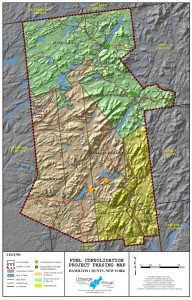 The Hamilton County Consolidation Study is the third and final phase of the County managed the shared fuel delivery project. This will allow all municipalities, agencies and stakeholders within Hamilton County to obtain fuel from strategically positioned County managed fueling facilities. This Fuel Consolidation Project includes the decommissioning of existing Town, County and School motor fuel storage and dispensing facilities in Inlet, Wells, Hope and Benson and the installation of a properly designed/equipped fueling facility that can be shared by neighboring communities in the Towns of Inlet and Wells. Phase I and Phase II benefited the Northern and Central parts of the County, Phase III will benefit the rest of the County including the Towns of Inlet, Morehouse, Wells, Hope, Benson, Raquette Lake, the Wells Central School District, as well as all local municipal fire and ambulance providers.
The Hamilton County Consolidation Study is the third and final phase of the County managed the shared fuel delivery project. This will allow all municipalities, agencies and stakeholders within Hamilton County to obtain fuel from strategically positioned County managed fueling facilities. This Fuel Consolidation Project includes the decommissioning of existing Town, County and School motor fuel storage and dispensing facilities in Inlet, Wells, Hope and Benson and the installation of a properly designed/equipped fueling facility that can be shared by neighboring communities in the Towns of Inlet and Wells. Phase I and Phase II benefited the Northern and Central parts of the County, Phase III will benefit the rest of the County including the Towns of Inlet, Morehouse, Wells, Hope, Benson, Raquette Lake, the Wells Central School District, as well as all local municipal fire and ambulance providers.
Currently, each municipality operates and maintains their own fuel storage and dispensing systems individually. This project intends to change this practice by installing shared facilities. The new system will be utilized with equipment that can remotely and automatically inform employees as to the status of the tanks at each participating site. This will allow the purchase of fuel in the right proportions and at the right times. The system will also aid in carrying out billing procedures since each buyer will swipe a municipal identification card, indicating to the central billing office from which municipality they are, which vehicle is taking on fuel, and the amount of fuel they purchased.
Being a successful long term, and soon to be County-wide project, this program serves as a model of how consolidating services can not only save taxpayer dollars but deliver environmentally safe fueling options while significantly reducing the need for unnecessary fuel and petroleum tanks. The program easily lends itself to replication by other municipalities and agencies. Simply by consolidating fueling options statewide, thousands of redundant fueling sites can be eliminated which, in turn, would help to protect millions of gallons of groundwater, countless miles of streams and shorelines, and hundreds of thousands of tons of soil.


